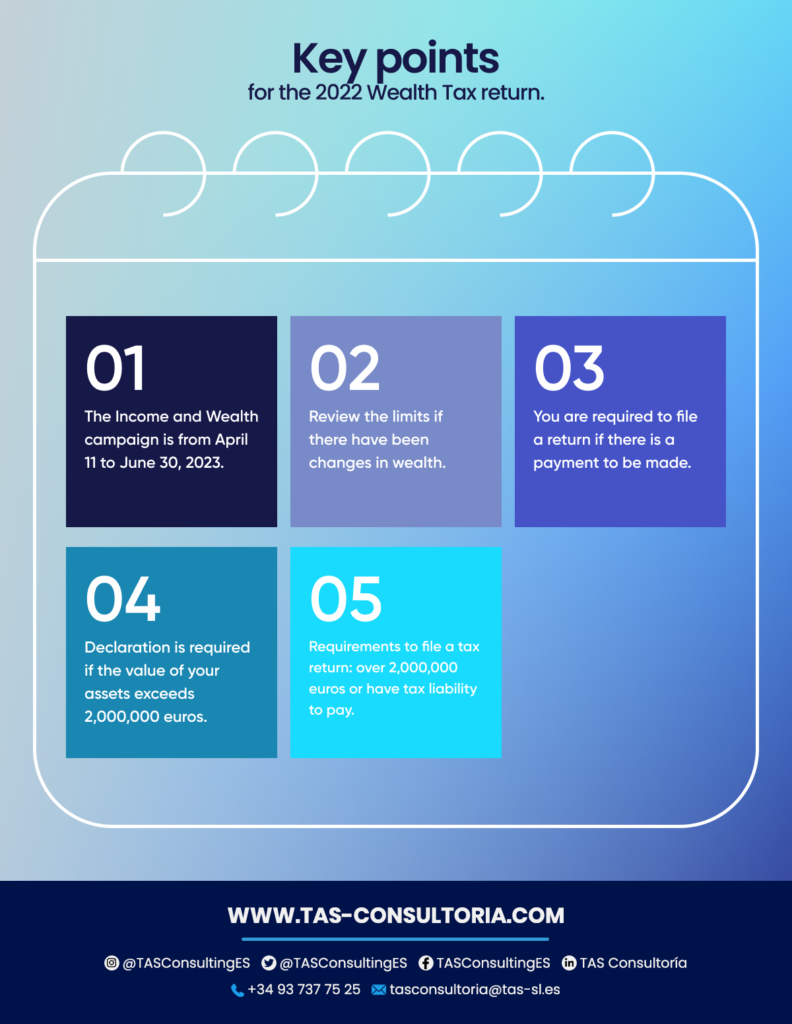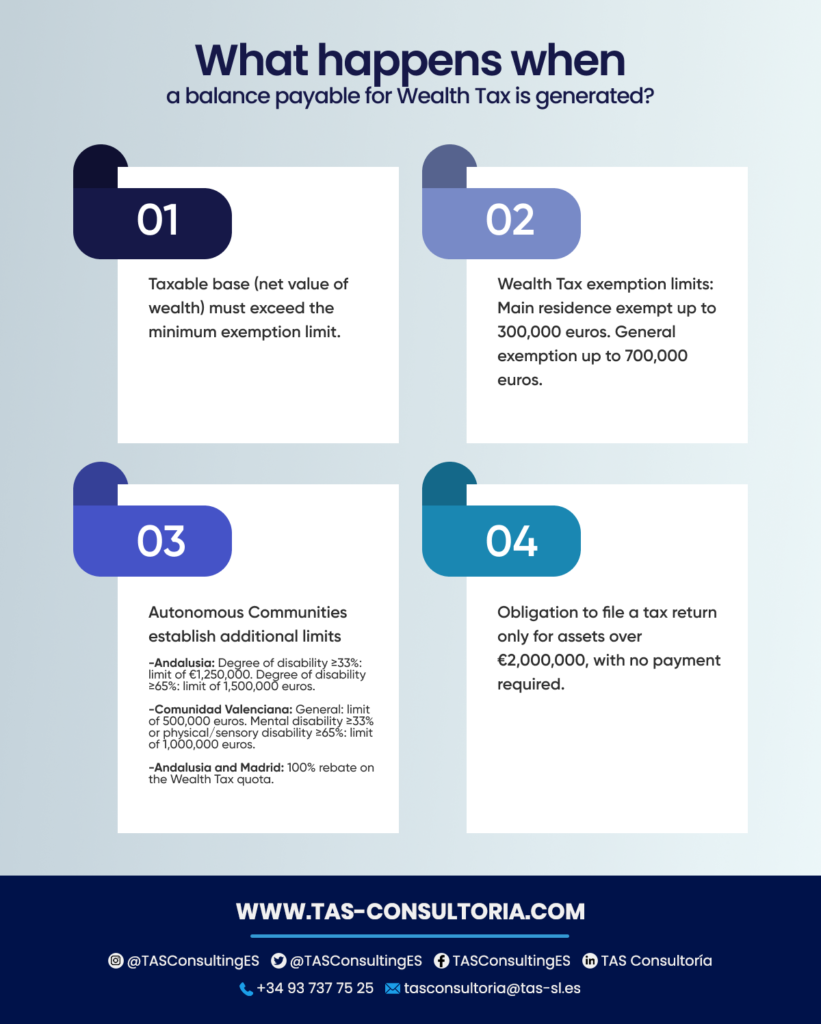
The deadline for voluntary payment of Wealth Tax, Form 714, is approaching. Therefore, this is the ideal time to check whether you are obliged to comply with this procedure. As with the IRPF, not everyone must do it. Do you want to know what requirements you must meet to have the duty to pay it? Find out here about that and much more, join us!
What is the wealth tax?
The Wealth Tax is a direct tax levied on individuals and their wealth. This tax is levied on all assets and economic rights owned by the taxpayer, taking into account the charges and encumbrances that may reduce their value. For example, personal debts and obligations that the holder must assume.
The management of this tax is regulated by Law 19/1991, of June 6, 1991, and is the responsibility of the autonomous communities. This means that its application can vary considerably, as we shall see, due to the differences existing between them.
You may also be interested in: What are the penalties imposed by the Tax Agency?
What is the Wealth Tax calculation?
The Wealth Tax is calculated with reference to the date of December 31 of each year. This implies that the wealth owned by the taxpayer on that specific date is considered.
Thus, in order to comply with this tax obligation, it is necessary to file Form 714, following the same tax calendar applied for the income tax return.
When it comes to accounting for your wealth, some assets are easy to value. Among them, bank accounts, stocks and investment funds. However, in the case of real estate, the situation is more complex and we must consider the maximum value between:
- The cadastral value indicated in the receipt, corresponding to the Real Estate Tax for the year 2021.
- The value determined or verified by the Administration for other taxes. For example, the Transfer Tax and Stamp Duty. Also, keep in mind how the new Cadastre Reference Value affects you if you have acquired a property as of January 1, 2022.
- The price, consideration or acquisition value.
With respect to debts, they are valued at their nominal value on the date on which the Wealth Tax accrues. They will only be deductible if they are duly justified.
Finally, what assets make up your wealth? Those that must be accounted for in order to assess whether you are subject to Wealth Tax. Some of them are:
- Real estate
- Bank deposits
- Shares or equity interests
- Life insurance and temporary or life annuities,
- Jewelry, furs, art objects and antiques.
- Cars over 125 cc, boats and aircrafts.
- Rights in rem and administrative concessions.
You may also be interested in: How to defer the payment of taxes in Spain?
What is the deadline for filing the 2022 Wealth Tax return?
The beginning of the Income and Wealth tax campaign is from April 11 until June 30, 2023. In that sense, what are the thresholds from which you must file the Wealth Tax?
It is essential to check these limits, especially if your estate has undergone significant changes from the previous year. For example, the acceptance of an inheritance or the receipt of a substantial bond and its subsequent investment.
Article 37 of Wealth Tax Law 19/1991 states that taxpayers are obliged to file a tax return. Provided that, after applying the corresponding deductions or allowances, there is a payment to be made according to the tax rules.
In addition, the filing of a declaration is required when the value of your assets or rights. Of course, evaluated according to the tax rules, it exceeds 2,000,000 euros.
In summary, you will be obliged to file a Wealth Tax return if you meet any of the following requirements:

When the value of the assets or rights exceeds 2,000,000 euros
In order to apply this limit in the Wealth Tax return, you must consider that:
- The declaration includes all the assets and rights of the taxpayer, both those exempt from the tax and those that are not. This without considering the charges or encumbrances that may affect its value. As well as the debts or personal obligations for which the taxpayer is responsible.
- The case of non-residents who are taxed by real obligation is different. Only the value of the assets and rights that are located must be considered. And not only that, but also that they can be exercised or must be fulfilled in Spanish territory.
When a balance payable for Wealth Tax is generated
When the total value of the assets or rights is less than 2,000,000 euros, it is mandatory to file the Wealth Tax return. That is if the amount to be paid is positive.
This occurs when the taxable income, i.e., the net worth of the taxpayer’s assets, exceeds the minimum exemption limit.
In that sense, the exemption limits applicable to Wealth Tax are:
- The main residence is exempt up to a maximum of 300,000 euros.
- In general, an exemption of up to 700,000 euros applies.
In addition, several Autonomous Communities have established additional limits
For example, in Andalusia the following limits apply depending on the degree of disability:
- The maximum amount established is 1,250,000 euros for persons with a degree of disability of 33% or higher. However, those with a degree of disability equal to or greater than 65% have a limit of 1,500,000 euros.
In the Valencian Community, the limits are as follows:
- 500,000 euros on a general basis.
- If you have a degree of mental disability equal to or greater than 33%. Or a degree of physical or sensory disability equal to or greater than 65%, you can receive 1,000,000 euros.
In the Autonomous Communities of Andalusia and Madrid, a 100% rebate is applied to the Wealth Tax quota.
This means that only those who have assets of more than 2,000,000 euros will be obliged to declare. This without having to make any payments.

You may also be interested in: Types of taxes in Spain: direct and indirect taxes
In short, it is vital to understand your Wealth Tax obligations in order to maintain a proper tax situation.
Do you have doubts or need specific guidance on how it affects your assets? Contact us at tasconsultoria@tas-sl.es and our team of legal and tax experts will be at your disposal. Do not hesitate to contact us to schedule your free consultation and receive personalized advice!




Your email address will not be published .
Required fields are marked with *